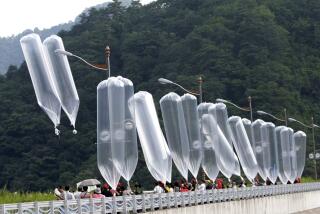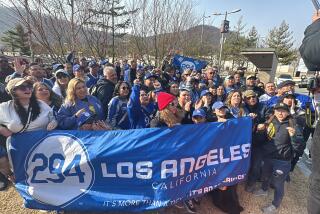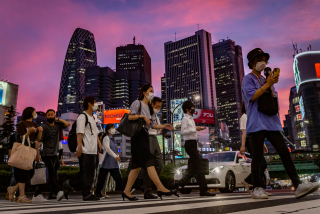Hope to Prevent Terrorism in Seoul : Airports Tighten Security for Olympics
- Share via
TOKYO — Asian airports have tightened security to prevent acts of terrorism during the Summer Olympics in South Korea this month.
Authorities in Japan, Taiwan, Southeast Asia and all the way to Australia, in addition to South Korea itself, are clamping down on possible threats they believe could come from communist North Korea, members of the Japanese Red Army gang, South Korean radicals or a host of other quarters.
“Experts in terrorism are justified in concerning themselves with every eventuality, and every precaution should be taken to preclude any threat, no matter what the source,” Edward J. Derwinski, U.S. undersecretary of state for security assistance, said recently in Washington.
Amid fears that terrorists could try to enter South Korea from Japan, airports throughout Japan have intensified checks of passengers and their baggage, frisking individuals twice and sending them through two metal detectors before boarding planes.
More Customs Agents
Japanese authorities have deployed special X-ray machines that can detect plastic explosives, and immigration and customs personnel have been increased to check passports and carry-on baggage.
Japanese airlines are stepping up inspections of liquor bottles, because explosives in such a liquor bottle were believed responsible for the bomb blast that destroyed a Korean Air Lines jet near Burma in November, killing 115 people. A confessed North Korean agent said she planted the explosives on board to disrupt the Sept. 17-Oct. 2 Summer Games in Seoul and last year’s South Korean presidential elections.
Armed guards have been assigned to ferries operating between Japan and South Korea, and Japan’s coast guard is deploying 80% of its patrol boats and planes to the Sea of Japan to thwart potential smuggling of explosives and weapons into South Korea.
Several known or suspected Japanese Red Army members have been arrested in recent months, some traveling on false passports. One of them, Osamu Maruoka, was carrying a one-way ticket to Seoul, South Korea’s capital.
“He may have intended to set up a new cell there or to work with one already in existence to stage terrorist attacks in South Korea in conjunction with the Olympic Games,” said the U.S. State Department’s annual report on terrorism.
Airports Closely Watched
The Philippine military is closely watching airports to detect terrorists, and immigration officials are carefully scrutinizing entry of Korean nationals.
“It is a cooperative effort among the countries in this part of the world to prevent the movement of known and identified terrorists who may attempt to go to Korea and conduct terrorism,” the Philippines military chief of staff, Gen. Renato de Villa, said.
Police arrested one Red Army member in Manila this year who had undergone radical plastic surgery, and others are suspected of living in the Philippines for several years. Posters of suspected Red Army members are displayed at Manila’s airport, as well as at airports in other Asian countries.
Thailand began anti-terrorist measures Aug. 1 by deploying air force commandos and a tank at Don Muang International Airport, according to airport general manager Charoon Peetong. Authorities are exchanging information with other international agencies to monitor potential threats, Charoon said.
Other airports, such as Sukarno-Hatta in Jakarta, Indonesia; Subang in Kuala Lumpur, Malaysia; Chiang Kai-shek in Taipei, Taiwan; Singapore’s Changi; Hong Kong’s Kai Tak and Australian airports have no new measures and are relying on what they believe are sufficient precautions. At Kai Tak in Hong Kong, machine-gun-toting commandos routinely make patrols.
Reprisals Feared
None of the measures rival those taken in South Korea itself, where authorities fear reprisals from neighboring North Korea after its pleas to co-host the Summer Games were rejected by the International Olympic Committee.
At Seoul’s Kimpo International Airport, which has a reputation for some of the strictest security at any commercial airport, passengers must go through metal detectors when leaving planes. Troops in full battle gear patrol regularly, and huge searchlights pan nearby fields at night. Since November, soldiers with submachine guns have been patrolling Kimpo’s departure lobby.
The threat at Kimpo was highlighted in 1986 when, a few days before the opening of the Asian Games, a bomb went off, killing five people. Seoul blamed North Korea for that attack.
South Korea is also concerned by North Korea’s recent deployment of surface-to-air missiles capable of hitting planes flying near Kimpo.
More to Read
Sign up for Essential California
The most important California stories and recommendations in your inbox every morning.
You may occasionally receive promotional content from the Los Angeles Times.













